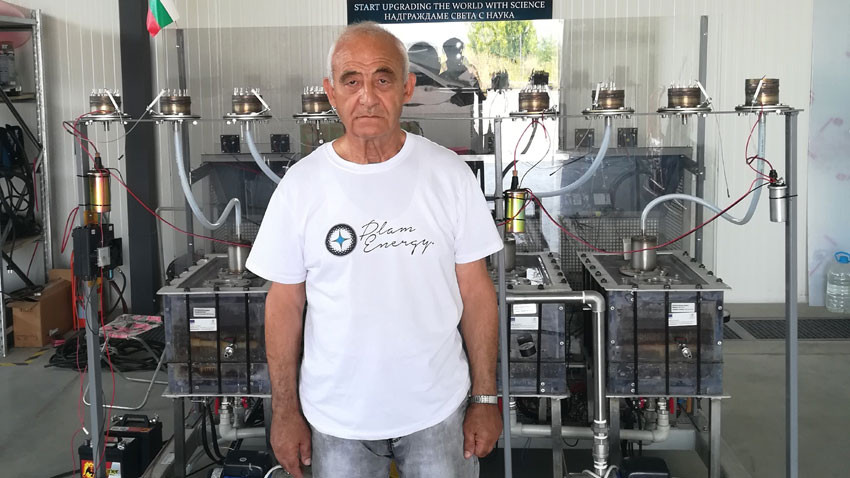"Created from water and turned again to water, producing clean energy” is the way Bulgarian Ilia Valkov described the so-called Brown’s gas. He is known as Australian scientist Yull Brown because he immigrated to Australia in the middle of the 20th century. There in the 1970s he was experimenting with producing oxyhydrogen from water through electrolysis, separating the water molecule into a mixture of hydrogen and oxygen at a ratio of 2:1. This gas mixture is also known as Brown’s gas and when ignited, it converts to water vapor and releases energy. The scientist, however, claimed to have found a method to use implosion characteristics of the gas for producing energy. The scientific community remained skeptical to these claims that contradict laws of thermodynamics and chemistry. Still, Brown’s gas has a number of applications and is used for metal cutting and welding.
Two Bulgarian scientists have recently developed and patented an installation for extraction of Brown’s gas and mineral deposits from seawater. With their project, funded under the "Innovation and Competitiveness" Operational Program in Bulgaria, engineers Chavdar Kamenarov and Plamen Kamenarov have achieved success in the field of renewable energy sources:

“Initially our goal was extracting energy from water, but in the process it turned out that extracted mineral deposits are more valuable than the gas itself,” engineer Chavdar Kamenarov says. "So, instead of getting energy, we received mineral resources. This is how the idea to use the gas in the process of extraction of minerals was born. We obtain these minerals in the form of sludge, extremely rich in polymetals.”
The interesting thing here is that the technology allows selective accumulation of certain metals at the expense of others. Another great advantage is that the technology does not pollute the environment but actually can be used to purify highly polluted industrial waters:
“In addition to extraction of mineral resources, clean drinkable water can be extracted from the sea,” Kamenarov continues. “At a later stage, the technology can be used as an installation for incinerating household waste and converting it into thermal or electrical energy. The very presence of Brown’s gas reduces toxicity but does not remove it completely and construction of air purification installations is required. In addition to the listed applications, the installation we have created can also be used for cleaning tailings ponds where extremely harmful radioactive waste is accumulated. Brown’s gas is successfully used in China to neutralize waste from nuclear power plants.”
At the end of September the invention will be presented in Plovdiv to the scientific community and industry representatives.
English: Alexander Markov
Photos: private library
President Rumen Radev will today attend the opening ceremony of Forest Week in front of St Alexander Nevsky Cathedral. The theme of this year's celebrations is "A century of eternal creation, preservation and care!" This year marks the 100th..
For 100 years, foresters in Bulgaria have been organizing Forest Week. A concert entitled “A century of eternity” on 7 April will give the official start to the initiative dedicated to the planet’s lungs. And though it has been a century since..
The eagerly-awaited Tulip Parade at the University Botanical Garden in Balchik is at its peak. This year’s parade includes more than 45,000 bulbs, and 27 varieties that are new to the Garden, among them Tulipa "Carnaval de Nice, which combines..
Shortly after the opening of the motorcycle season in Sofia at the end of March, Bulgaria's capital city will host the country's largest motorcycle..
Since its establishment on April 11, 2022, the Institute for Computer Science, Artificial Intelligence and Technology – INSAIT has..
Romanian police and military personnel worked as mercenaries in Congo According to a report by the Romanian Ministry of the Interior, 11..

+359 2 9336 661
